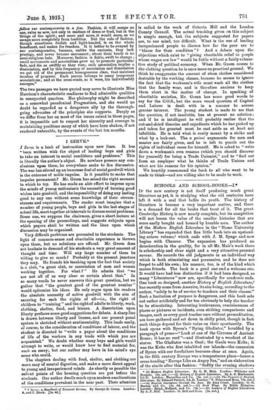I SERVE.*
I Serve is a book of instruction upon new lines. It Las "been written with the object of leading boys and girls to take an interest in social conditions and problems." This is literally the author's object. He nowhere presses any con- clusions upon them, he everywhere seeks to fire discussion. The war has stirred up an immense deal of social goodwill which is the outcome of noble impulse. Is it passible to make that impulse permanent ? Mr. Green has seized the right moment in which to try. He has made an able effort to impress upon the minds of young enthusiasts the necessity of turning good wishes into goodwill, and the impossibility of doing any lasting good to any one without some knowledge of their circum- stances and. requirements. The reader must imagine that a number of young people, boys and girls in the last stages of school life, meet together at intervale to disease social problems. Some one, we suppose the chairman, gives a short lecture at the opening of the proceedings, and suggests subjects upon which papers shall be written and the lines upon which discussion may be organized.
Very difficult problems are presented to the students. The light of common-sense and charitable experience is thrown upon them, but no solutions are offered. Mr. Green does not hesitate to demand of his students a very great amount of thought and time. Will any large number of them be willing to give so much ? Probably at the present juncture they may. He founds his teaching upon the fact that society is a club, "a great club, or association of men and women working together. For what ? " He admits; that "we are not all of us very clear or certain about that." In so many words he never answers this great question, but we gather that "the greatest good of the greatest number" would epitomize his ideas. He only urges upon his readers the absolute necessity of active goodwill with the aim of securing for each the rights of all—i.e., the right of children to " training " and the right of adults to liberty, work, clothing, shelter, food, and leisure. A dissertation upon liberty prefaces some good suggestions for debate. A sharp line is drawn between liberty and license, and. our present penal system is sketched without sentimentality. This leads easily, of course, to the consideration of conditions of labour, and the student is directed to "write a paper about the conditions of life of the workers in any trade with which you are acquainted." We doubt whether many boys and girls would attempt to write, or would know how to find material for, such an essay; but our author may have in his mind's eye some who could.
The chapters dealing with food, shelter, and clothing are more easy of mental digestion, and makes more direct appeal to young and inexperienced minds. As shortly as possible the salient points of the housing question are put before the students. Our author dwells much upon modern ameliorations of the conditions prevalent in the near past. Their attention • I Serra a Handbook of Par•onal Herniae. By George H. Oxen London A. and C. Black. De. 4e1.] is called to the work of Octavia Hill and the London County Council. The actual teaching given on this subject is simple enough, but the subjects suggested for papers are, to our mind, too difficult. What is the use of leading inexperienced people to discuss bow far the poor are to "blame for their condition"? And a debate upon the objections which exist to "giving charitable relief to people whose wages are low" would be futile without a fairly exhaus- tive study of political economy. When Mr. Green comes to the clothing question he is once more on practical ground. We think he exaggerates the amount of clean clothes considered desirable by the working classes, because lm seems to ignore the fact that the workman's wife must wash all the clothes that the family wear, and is therefore anxious to keep them short in the matter of change. In speaking of charitable societies, Mr. Green has some good words to say for the C.O.S., but the more vexed question of Capital and Labour is dealt with in a manner to arouse greater interest. The young student in made to see that the question, if not insoluble, has at present no solution; and if he is intelligent he will probably realize that the cut-and-dried theories and expedients which he has picked up and taken for granted must be east aside as at least not infallible. He is told what is really meant by a strike and what by a lock-out. The is priori arguments for men and master are fairly given, and he is left to puzzle out the rights of individual eases for himself. He is asked to "write down a workman's own reasons (which you should discover for yourself) for being a Trade Unionist," and to "find out from an employer what he thinks of Trade Unions and what are his reasons for his opinion."
We heartily recommend the book to all who want to be made to think—and are willing also to be made to work.


































 Previous page
Previous page